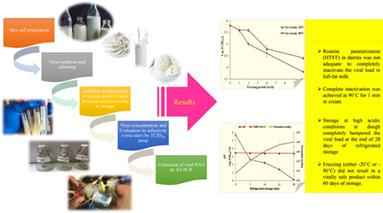当前位置:
X-MOL 学术
›
J. Food Saf.
›
论文详情
Our official English website, www.x-mol.net, welcomes your feedback! (Note: you will need to create a separate account there.)
Stability of severe acute respiratory syndrome coronavirus 2 in dairy products
Journal of Food Safety ( IF 2.4 ) Pub Date : 2021-07-04 , DOI: 10.1111/jfs.12917 Sahar Norouzbeigi 1 , Reza Yekta 1 , Leily Vahid-Dastjerdi 1 , Hossein Keyvani 2 , Mohammad Mehdi Ranjbar 3 , Mahdi Shadnoush 4 , Nasim Khorshidian 5 , Mojtaba Yousefi 6 , Sara Sohrabvandi 5 , Amir M Mortazavian 7
Journal of Food Safety ( IF 2.4 ) Pub Date : 2021-07-04 , DOI: 10.1111/jfs.12917 Sahar Norouzbeigi 1 , Reza Yekta 1 , Leily Vahid-Dastjerdi 1 , Hossein Keyvani 2 , Mohammad Mehdi Ranjbar 3 , Mahdi Shadnoush 4 , Nasim Khorshidian 5 , Mojtaba Yousefi 6 , Sara Sohrabvandi 5 , Amir M Mortazavian 7
Affiliation

|
The present investigation was performed to determine the stability of severe acute respiratory syndrome coronavirus 2 (SARS-CoV-2) under several industrial processing situations in dairies, including pasteurization, freezing, and storage in acidic conditions. Ten treatments were selected, including high-temperature short-time (HTST)-pasteurized low-fat milk, low-temperature long-time-pasteurized low-fat milk, extended shelf life (ESL)-pasteurized low-fat milk, HTST-pasteurized full-fat milk, LTLT-pasteurized full-fat milk, ESL-pasteurized full-fat milk, pasteurized cream, ice cream frozen and stored at −20 or −80°C, and Doogh (as a fermented milk drink with initial pH < 3.5) refrigerated for 28 days. The viral particles were quantified by RT-PCR methodology. Besides, the virus infectivity was assessed through fifty-percent tissue culture infective dose (TCID50) assay. These products were seeded with a viral load of 5.65 log TCID50/mL as a simulated cross-contamination condition. Pasteurization techniques were sufficient for complete inactivation of the SARS-CoV-2 in the most dairy products, and 1.85 log TCID50/mL virus reduction in full-fat milk (fat content = 3.22%). Freezing (either −20°C or −80°C) did not result in a virally safe product within 60 days of storage. Storage at high acidic conditions (initial pH < 3.5) completely hampered the viral load at the end of 28 days of refrigerated storage. This research represents an important practical achievement that the routine HTST pasteurization in dairies was inadequate to completely inactivate the viral load in full-fat milk, probably due to the protective effect of fat content. Furthermore, freezing retain the virus infectivity in food products, and therefore, relevant contaminated foods may act as carriers for SARS-CoV-2.
中文翻译:

乳制品中严重急性呼吸综合征冠状病毒 2 的稳定性
本研究旨在确定严重急性呼吸综合征冠状病毒 2 (SARS-CoV-2) 在乳制品工业加工条件下的稳定性,包括巴氏杀菌、冷冻和酸性条件下的储存。选择了10个处理,包括高温短时间(HTST)-巴氏杀菌低脂牛奶、低温长时间-巴氏杀菌低脂牛奶、延长保质期(ESL)-巴氏杀菌低脂牛奶、HTST-巴氏杀菌全脂牛奶、LTLT 巴氏杀菌全脂牛奶、ESL 巴氏杀菌全脂牛奶、巴氏杀菌奶油、在 -20 或 -80°C 下冷冻和储存的冰淇淋以及 Doogh(作为具有初始 pH 值的发酵乳饮料< 3.5) 冷藏 28 天。通过 RT-PCR 方法对病毒颗粒进行量化。除了,50 ) 测定。这些产品以 5.65 log TCID 50 /mL 的病毒载量作为模拟交叉污染条件接种。巴氏杀菌技术足以完全灭活大多数乳制品中的 SARS-CoV-2,以及 1.85 log TCID 50/mL 全脂牛奶中的病毒减少量(脂肪含量 = 3.22%)。冷冻(-20°C 或 -80°C)在储存 60 天内不会产生病毒安全的产品。在冷藏储存 28 天结束时,在高酸性条件下(初始 pH < 3.5)储存完全阻碍了病毒载量。这项研究代表了一项重要的实际成就,即乳制品中的常规 HTST 巴氏杀菌不足以完全灭活全脂牛奶中的病毒载量,这可能是由于脂肪含量的保护作用。此外,冷冻保留了食品中的病毒传染性,因此相关的受污染食品可能成为 SARS-CoV-2 的载体。
更新日期:2021-07-04
中文翻译:

乳制品中严重急性呼吸综合征冠状病毒 2 的稳定性
本研究旨在确定严重急性呼吸综合征冠状病毒 2 (SARS-CoV-2) 在乳制品工业加工条件下的稳定性,包括巴氏杀菌、冷冻和酸性条件下的储存。选择了10个处理,包括高温短时间(HTST)-巴氏杀菌低脂牛奶、低温长时间-巴氏杀菌低脂牛奶、延长保质期(ESL)-巴氏杀菌低脂牛奶、HTST-巴氏杀菌全脂牛奶、LTLT 巴氏杀菌全脂牛奶、ESL 巴氏杀菌全脂牛奶、巴氏杀菌奶油、在 -20 或 -80°C 下冷冻和储存的冰淇淋以及 Doogh(作为具有初始 pH 值的发酵乳饮料< 3.5) 冷藏 28 天。通过 RT-PCR 方法对病毒颗粒进行量化。除了,50 ) 测定。这些产品以 5.65 log TCID 50 /mL 的病毒载量作为模拟交叉污染条件接种。巴氏杀菌技术足以完全灭活大多数乳制品中的 SARS-CoV-2,以及 1.85 log TCID 50/mL 全脂牛奶中的病毒减少量(脂肪含量 = 3.22%)。冷冻(-20°C 或 -80°C)在储存 60 天内不会产生病毒安全的产品。在冷藏储存 28 天结束时,在高酸性条件下(初始 pH < 3.5)储存完全阻碍了病毒载量。这项研究代表了一项重要的实际成就,即乳制品中的常规 HTST 巴氏杀菌不足以完全灭活全脂牛奶中的病毒载量,这可能是由于脂肪含量的保护作用。此外,冷冻保留了食品中的病毒传染性,因此相关的受污染食品可能成为 SARS-CoV-2 的载体。



























 京公网安备 11010802027423号
京公网安备 11010802027423号